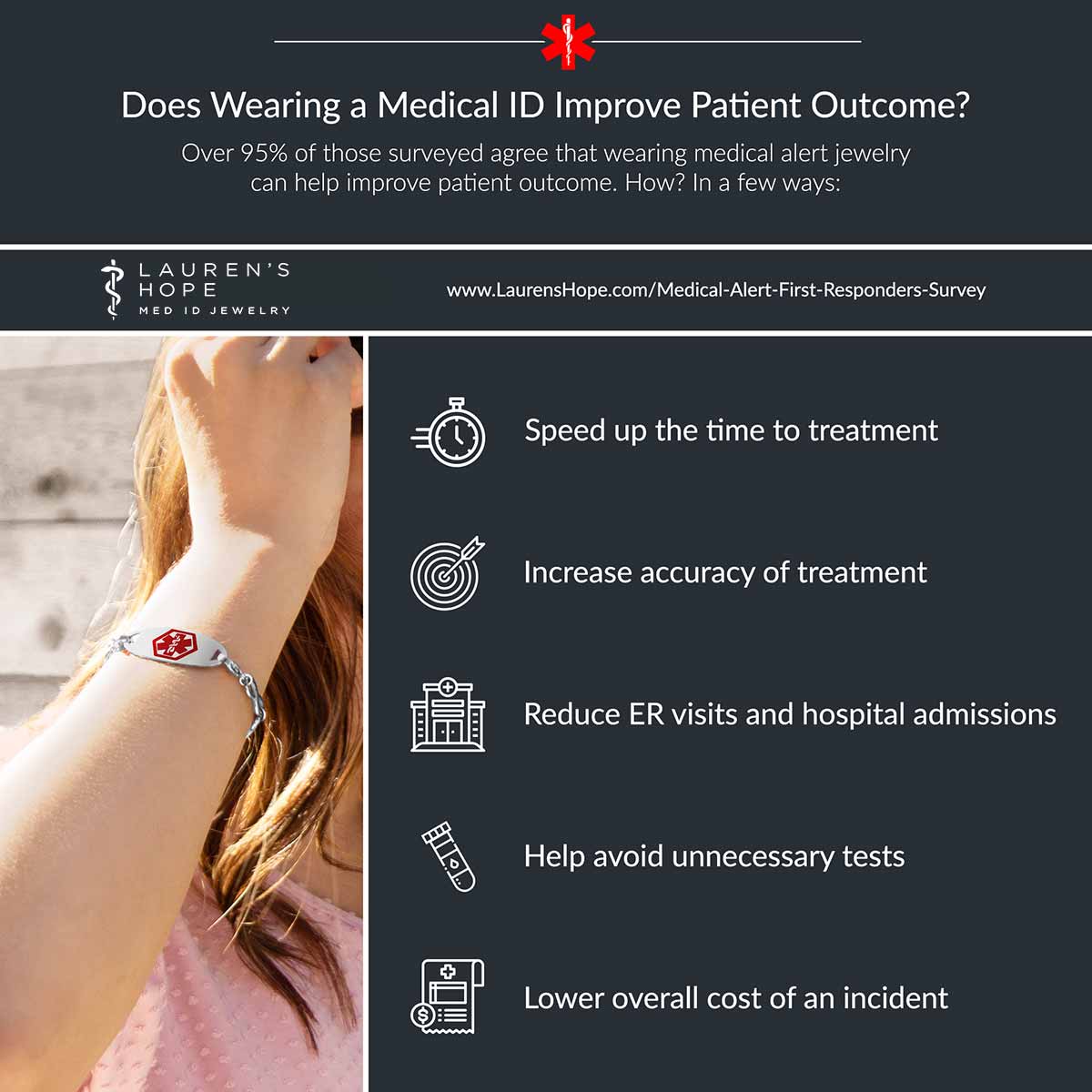Do Medical ID Bracelets Work?
In 2020, Lauren’s Hope conducted a non-incentivized, independent survey of more than 100 EMTs, paramedics, ER doctors, and other front-line medical care providers. Questions ranged from how pre-hospital care providers identify and utilize medical alert jewelry to whether hospital personnel use USB Medical IDs and what they would like people to engrave on their medic alerts.
Does Wearing a Medical ID Improve Patient Outcome?
Over 95% of those surveyed agree that wearing medical alert jewelry can help improve patient outcome. How? In a few ways:
- Speed up the time to treatment
- Increase accuracy of treatment
- Reduce ER visits and hospital admissions
- Help avoid unnecessary tests
- Lower overall cost of an incident
“Medical ID jewelry can be a great indicator for diagnosing the problem...We need to use these medical alert(s) as an adjunct to our assessments in order to provide the best possible patient care.”
-Michael Dodd, EMT-P
Does Wearing a Medical Alert Help Speed Up Treatment?
While every situation is different, 87% of medical professionals surveyed agree that medical alert jewelry can help speed up treatment. Wearing a custom-engraved, clearly identifiable medical alert provides EMTs with fast access to key information, which may then speed up diagnosis and reduce the time it takes for you to receive the right treatment.
“Medical ID's are a great way to let EMS know vital health information when you don't have family or friends around and you cannot speak for yourself. Medical ID's can speed up the diagnosis time allowing EMS to give life saving medications faster.”
-Austin B., EMT

Do Emergency Medical Providers Use USB Med IDs?
Overwhelmingly, the answer here is NO. In fact, 100% of EMTs and hospital personnel stated that they NEVER access patient information via USB medical IDs or patient flash drives.
“For HIPAA reasons, I will not use a USB or website external to my agency.”
-EMT
While the concept is popular, in reality, most ambulance and hospital systems prohibit the use of external flash drives due to legal restrictions (EG: health data privacy and technology statutes) and the risks to their own systems. Further, paramedics report that they simply do not have time to take this extra step.
“EMS generally doesn't have the time or resources to check on USB or other types of electronic medical IDs.”
- Emma R., EMT-B
What Are The Most Effective Forms of Medical Alert Jewelry?
Over 80% of respondents agreed that the most effective medical alert bracelets and necklaces are those with custom engraving so they are truly unique to the wearer.
While every type of medical professional, in different settings, will have varying opinions, needs, and priorities, the bottom line is that having a medical alert that is custom engraved with your identity, vital medical information, and emergency contacts is vital.

What Information Do Medical Professionals Want to See On My Medical Alert?
This is both a simple and a complex question because the information a Paramedic needs is not necessarily the same as what the hospital staff wants.
For instance, according to Zachary DiGiusto, NRAEMT, as an Advanced EMT, “I need to know information that can help me form a field diagnosis and understand why you might be unconscious (i.e. diabetes or blood thinners might indicate stroke), or how to best assess you (i.e. no BP on right side or cognitive impairments), or how to manage you (i.e. hearing loss). I am only with a patient for 10-30 minutes, so certain information may be important to the receiving facility/physician, but not me as EMS.”
“For medications and medical conditions, I [am] concerned with meds that have severe reactions to other common emergency medicines. For medical conditions I am usually only worried about conditions that can cause an actual medical emergency, example, lethal cardiac arrhythmia, cancer or tumors that are a likely cause of this problem.”
-Josh, RN BSN
Check out tips for engraving tips and medical abbreviations here.

Lauren's Hope provided opportunities for people to comment with and without having their names published, so some quotes are simply associated with a job title while others are more thoroughly attributed.